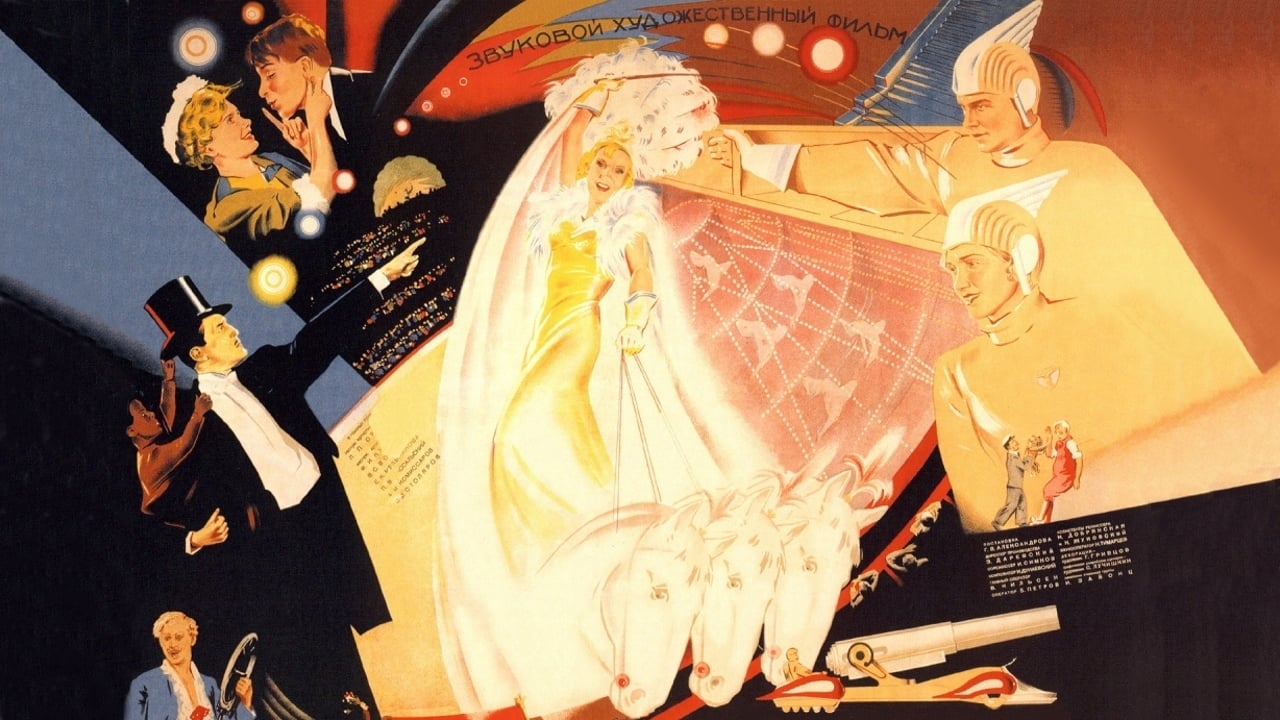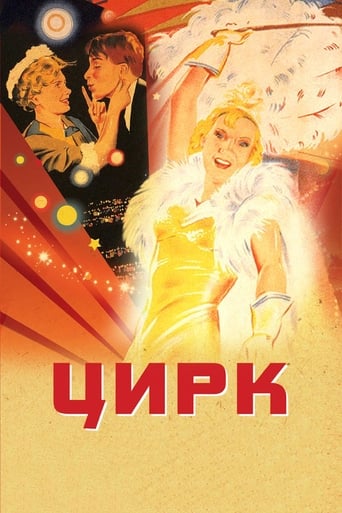



I like the storyline of this show,it attract me so much
View MoreSelf-important, over-dramatic, uninspired.
It’s not bad or unwatchable but despite the amplitude of the spectacle, the end result is underwhelming.
View MoreIt's easily one of the freshest, sharpest and most enjoyable films of this year.
View MoreCircus (1936) is a romantic-farce-musical directed by Grigorii Aleksandrov (1903-1983) who started as an assistant director to Sergei Eisenstein before graduating into the ranks of the great Soviet musical directors. Lyubov Orlova, the wife of Aleksandrov (and incidentally Stalin's favorite movie star), stars as Marion Dixon, a circus performer who flees to the Soviet Union only to be plagued by her troubled past of committing "history's biggest crime" of sleeping with a colored man and conceiving a colored child. Dixon falls in love with a theater director but is blackmailed by a Western man who has knowledge of her illustrious affair.While the arrival of sound brought a regression in the aesthetics of cinema, Circus manages to maintain the specificities of the medium offering spectacular visual sequences and technical perfection that makes the film seem rather Hitchockian. There are moments of Chaplinesque physical comedy (as well as a character physically resembling the Tramp (Chaplin's The Circus (1928) was made only six years earlier)) such as the man pulling the feather from the swan, using the feather as a pen, before putting it back into the swan. Aleksandrov stages the two protagonists falling in love in a spectacular shot as the camera pans down from Marion's face, to the couple holding hands in the reflection of the piano before rotating 180 degrees. Stalinist cinema, also known as socialist realism, abandoned the formalism that had categorized the Soviet films of the 1920s, to instead focus on wholesome entertainment and strong characters and plot intended for the masses. The films were similar to Hollywood narratives but located on the opposite ideological spectrum as they consisted of a naive, but good-natured hero developing the communist consciousness. Like, Chapaev (1934), Circus embodies the synthesis of ideology and entertainment that the Soviet center-moderate critics sought to achieve. At the climax of the film, Marion is exposed in front of the circus audience with the blackmailer claiming her actions justify her "banish(ment) from civilized society." The film portrays the socialist Soviet Union as a place of acceptance and understanding, compared to the harsh reality of race relations in the United States and other Western nations. The last minutes of Circus drive the message home as masses of people march through the streets carrying flags and banners of Lenin and Stalin as Marion turns to her comrade proclaiming, "now I understand."
View MoreI haven't seen many propaganda films but among the ones I have seen, Tsirk was the most entertaining. Tsirk is a socialist propaganda movie commissioned by Stalin with an overall theme of equality and unity. Marion, played by Lyubov Orlova, is an American dancer on tour with a secret. Von Kneishitz her stage manager, who seems very German, knows her secret and threatens to expose her because he believes her secret is so scandalous that no one will accept her. In the end Marion's secret is exposed to the public but it turns out the public does not replace her, because they are soviet Russia and they accept everyone no matter what! It was interesting to see this movie and be able to compare it to the musicals that were being created at the same time in other parts of the world. I also found it interesting that they had to have a character in the movie that was evil and represented Germans. The very end of the movie was the best because the extreme amount of obvious propaganda. The movie as a whole was a propaganda film but the ending reminded me of watching the grand finale of a fireworks how they once gradually get faster and increase in number. The end of this movie was also like a grand finale for soviet propaganda. The song and the people involved with it gradually increased, got louder and a huge picture of Stalin was carried by the crowd. I'm glad I watched it for historical purposes but I would only recommend the film to someone who was interested in history or propaganda films.
View MoreWell Tsrik is a classic Russian propaganda film taking place mostly in the Circus in the 1930's. The basic theme of the movie revolves around the Stalin age of Russia where they accept everyone into their culture.The movie starts out in America with our main character on the run from Americans. She safely gets on the train to escape what we come to find out in the end is a racist mo of Americans. Throughout the film we are exposed to the tyranny of the German people through the only German in the play and his ability to be mysterious and controlling. Yet in the end, the Russian people come together to overcome racism and triumph not only over the German, but over the Americans as well, accepting the black child into their culture.The film itself is very well shot, with great context in each scene and accompanied with an excellent soundtrack. The clearly state funded film does well to portray its Stalin government and its unbiased approval of everyone and all accepting, whether black or white.I did enjoy the movie, as all propaganda films are never negative or depressing, they are all about coming together and this is very well portrayed in the end with the Giant city parade.
View MoreThe movie Tsirk is about a Russian woman named Mary who was a socially out casted for having a black child. During her escape she is meets her soon to be German manager Von Kneishitz. After running away from her previous life with her new born baby, she joins the circus. In this new group she is at least making a living but she still feels like she must hide from her past. Her manager, Von Kneishitz, is always reminding Mary of her situation and frequently threatens to reveal Mary's illegitimate child. As Mary becomes more at home in her new environment she begins to have feelings for the ideal Russian man. As her feelings continue to grow for the great Russian man the threat to reveal her child becomes more real. While pursuing her new love Mary's plans are thwarted by the conniving and evil German. The film ends in glory after Von Kneishitz reveals Mary's son. All the people under the big top unite to welcome the newly discovered child into the warm embrace of the Russian state. All of this happens while they laugh at the silly German for being racist and turn him into the outcast. This film is brimming with propaganda. This film shows just how great the Russian people are when they unite together to belittle the foolish and backward German. There is also a scene that features a giant poster of Stalin that helps the viewer to see that this work was used as propaganda. While on the one hand it supports Russian unity and demonstrated the evils of the German people it also was racist in its own rite. During one of the final scenes all of the different ethnic groups sing to the child in their own native language. The shot with the Jewish group singing to the child was cut out of the official soviet release. This was an interesting film but I would only recommend it to those interested in seeing how the Russian government was interested in spreading the message of the state through film.
View More